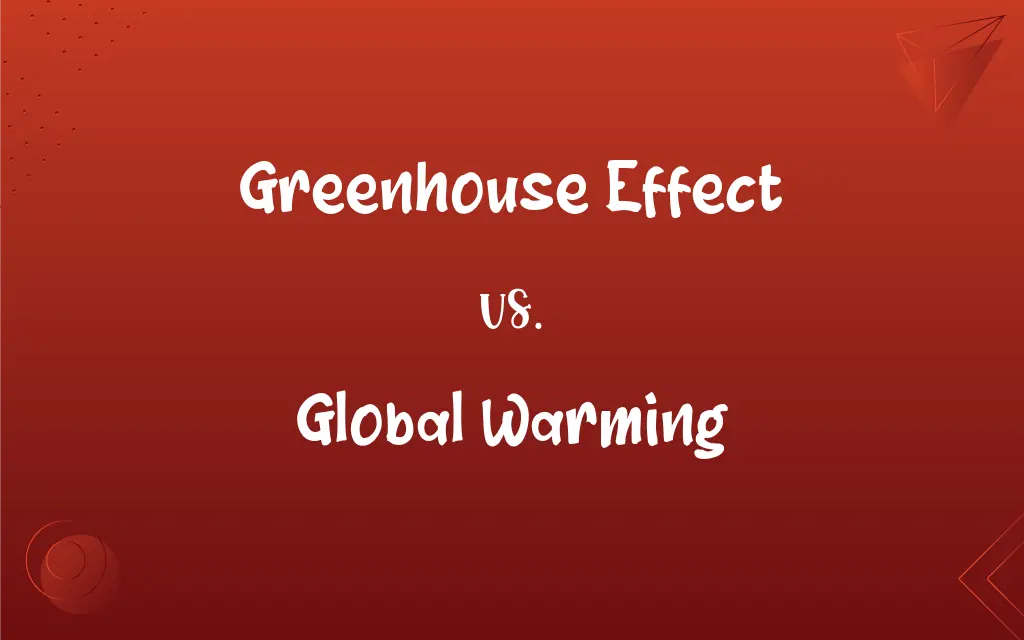Greenhouse Effect vs. Global Warming: What's the Difference?
Edited by Janet White || By Harlon Moss || Updated on October 17, 2023
The greenhouse effect is a natural process that warms the Earth's surface, while global warming refers to the long-term increase in Earth's average temperature due to human activities.

Key Differences
The greenhouse effect is a natural phenomenon where certain gases in Earth's atmosphere trap heat, preventing it from escaping into space. This process is essential for supporting life, as it keeps the planet's temperature stable. In contrast, global warming refers to the rise in the Earth's average temperature caused primarily by human-induced factors, notably the burning of fossil fuels.
Gases such as carbon dioxide, methane, and water vapor play a significant role in the greenhouse effect. They act like a blanket around our planet, capturing heat from the sun. However, global warming results when there is an excessive increase in these gases, particularly carbon dioxide, leading to an amplified greenhouse effect.
The greenhouse effect is not inherently harmful; in fact, without it, Earth would be too cold for most forms of life. But the problem arises when human actions exacerbate this effect, leading to global warming, which then causes climate changes, rising sea levels, and other environmental impacts.
Earth's history has witnessed various natural fluctuations in its temperature. While the greenhouse effect has always been present, the rate and extent of recent global warming, driven by human activities, are unprecedented in the context of the past millennia.
To address global warming, many strategies focus on reducing human emissions of greenhouse gases. This means that understanding the natural greenhouse effect is crucial, as it helps us recognize the consequences of amplifying it through human activities.
ADVERTISEMENT
Comparison Chart
Definition
Natural process that warms the Earth by trapping heat.
Long-term rise in Earth's temperature mainly due to human activities.
Cause
Caused by gases like CO2, methane, and water vapor.
Primarily caused by excessive emissions of greenhouse gases by human activities.
Impact
Essential for life; maintains Earth's temperature.
Causes climate change, sea-level rise, and other environmental impacts.
Solution/Response
Not something to be "solved"; it's a natural process.
Requires reduction in greenhouse gas emissions, sustainable practices, etc.
Historical Perspective
Always existed, making Earth habitable.
Recent rapid changes are unprecedented in the context of Earth's long-term history.
ADVERTISEMENT
Greenhouse Effect and Global Warming Definitions
Greenhouse Effect
Earth's natural "thermal blanket" created by specific atmospheric gases.
Without the greenhouse effect, temperatures would plunge dramatically.
Global Warming
An urgent environmental concern caused by enhanced greenhouse effect.
Actions to combat global warming include transitioning to renewable energy sources.
Greenhouse Effect
The natural process by which certain gases trap heat in Earth's atmosphere.
Thanks to the greenhouse effect, our planet remains warm enough to support life.
Global Warming
A long-term rise in Earth's temperature mainly from burning fossil fuels.
Deforestation and industrialization contribute significantly to global warming.
Greenhouse Effect
The phenomenon where gases prevent heat from escaping Earth.
Water vapor plays a significant role in the greenhouse effect.
Global Warming
The increase in Earth's average surface temperature due to human actions.
Scientists are concerned about the rapid pace of global warming in recent decades.
Greenhouse Effect
The warming of the Earth due to atmospheric gases trapping solar radiation.
The greenhouse effect is responsible for maintaining temperatures suitable for organisms.
Global Warming
The phenomenon of temperature increase linked to human-caused CO2 emissions.
Ice melt in the Arctic is a visible effect of global warming.
Greenhouse Effect
A process making Earth warmer than it would be without certain gases.
The greenhouse effect ensures Earth isn't frozen like Mars.
Global Warming
The ongoing temperature escalation on Earth's surface and oceans.
Coral reef bleaching is an adverse consequence of global warming.
FAQs
What is the greenhouse effect?
The greenhouse effect is a natural process where certain gases in Earth's atmosphere trap heat, warming the planet.
What is global warming?
Global warming refers to the long-term increase in Earth's average surface temperature primarily due to human activities.
Is the greenhouse effect bad?
The greenhouse effect is essential for life on Earth; however, problems arise when human activities exacerbate it, leading to global warming.
Are the greenhouse effect and global warming the same thing?
No, while the greenhouse effect is a natural process that warms Earth, global warming refers to the amplified warming due to human actions.
Which gases contribute to the greenhouse effect?
Gases like carbon dioxide, methane, water vapor, and nitrous oxide contribute significantly to the greenhouse effect.
What are the primary causes of global warming?
The burning of fossil fuels, deforestation, industrial processes, and other human activities are primary causes of global warming.
Is the greenhouse effect solely responsible for global warming?
While the greenhouse effect is a factor, global warming is exacerbated by the increased levels of greenhouse gases due to human activities.
Are global warming and climate change the same?
Global warming refers specifically to the rise in temperatures, while climate change encompasses global warming's broader impacts, including weather pattern shifts.
Why is global warming concerning?
Global warming can result in severe climate changes, rising sea levels, extreme weather events, and biodiversity loss.
Can we stop global warming completely?
While stopping it completely is challenging, we can mitigate its effects by adopting sustainable practices and reducing greenhouse gas emissions.
How does the greenhouse effect relate to the Earth's climate?
The greenhouse effect helps regulate the Earth's temperature, and without it, our planet would be inhospitably cold.
Are there ways to naturally enhance the greenhouse effect without causing global warming?
While the greenhouse effect is natural, excessive enhancement, even by natural means, could lead to imbalances and potential warming. It's crucial to maintain a balanced level of greenhouse gases.
What's the role of carbon dioxide in global warming?
Carbon dioxide is a primary greenhouse gas, and excessive amounts of it, mainly from burning fossil fuels, intensify global warming.
Are there any benefits to the greenhouse effect?
Yes, the greenhouse effect is essential for maintaining the Earth's habitable temperature, supporting life.
What's the difference between the greenhouse effect and the enhanced greenhouse effect?
While the greenhouse effect is natural, the enhanced greenhouse effect results from increased levels of greenhouse gases due to human actions, causing more rapid warming.
How do trees and forests relate to global warming?
Trees absorb carbon dioxide, reducing its levels in the atmosphere, which can help mitigate global warming. Deforestation, on the other hand, releases stored carbon and exacerbates global warming.
Why is there a focus on carbon emissions when discussing global warming?
Carbon emissions, especially from burning fossil fuels, are a leading cause of the enhanced greenhouse effect, driving global warming.
Has Earth always experienced the greenhouse effect?
Yes, the greenhouse effect has always been present, ensuring the planet remains warm enough for life.
How does global warming affect oceans?
Global warming leads to ocean warming, which can result in coral bleaching, rising sea levels, and disrupted marine ecosystems.
How can we reduce the impact of global warming?
By transitioning to renewable energy, reforesting, conserving energy, and promoting sustainable practices, we can reduce global warming's impact.
About Author
Written by
Harlon MossHarlon is a seasoned quality moderator and accomplished content writer for Difference Wiki. An alumnus of the prestigious University of California, he earned his degree in Computer Science. Leveraging his academic background, Harlon brings a meticulous and informed perspective to his work, ensuring content accuracy and excellence.
Edited by
Janet WhiteJanet White has been an esteemed writer and blogger for Difference Wiki. Holding a Master's degree in Science and Medical Journalism from the prestigious Boston University, she has consistently demonstrated her expertise and passion for her field. When she's not immersed in her work, Janet relishes her time exercising, delving into a good book, and cherishing moments with friends and family.































































